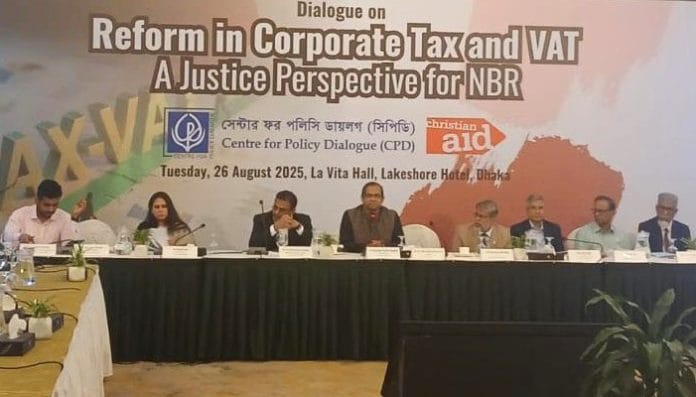An overwhelming majority of businesses in Bangladesh believe the current tax system is unfair and obstructive to growth, according to a new survey by the Centre for Policy Dialogue (CPD) unveiled Tuesday.
The survey, conducted among 123 companies in Dhaka and Chattogram in partnership with Christian Aid, found that 82 percent of businesses consider the existing tax rates to be unjust.
Business leaders participating in the study said these rates are not only excessive but also create a hostile environment for investment and expansion.
Beyond tax rates, the study exposed deep-rooted frustrations with tax administration practices. A staggering 79 percent of respondents cited a lack of accountability among tax officials, while 72 percent pointed to corruption within the system as a major obstacle to fair taxation.
Persistent disputes between businesses and tax authorities also emerged as a common issue. About 65 percent of surveyed businesses reported regular conflicts over tax claims, many of which they said stemmed from arbitrary decisions by tax officials.
Several business leaders interviewed claimed that taxes are often imposed without clear justification or prior notice. Such unpredictable practices, they argued, impose an additional psychological and financial burden beyond the actual tax amount.
The findings were presented at a dialogue on corporate tax and VAT reform held at Lakeshore Hotel in Dhaka, attended by tax officials, policy experts, and business representatives.
In a separate survey focused on VAT-related challenges, the CPD highlighted further concerns, particularly over the complexity and inconsistency of VAT laws.
Of the 389 firms surveyed—primarily from Dhaka and nearby districts—around 73.5 percent said the existing VAT system is too complex to navigate.
Businesses cited numerous other issues with VAT compliance, including vague regulations, poor cooperation from tax officials, limited access to training and awareness programs, confusion over product and service classification, and high costs associated with compliance.
The VAT survey was conducted following the structure of the World Bank’s Enterprise Survey framework.
CPD researchers emphasized that these findings point to a broader need for structural reform, both in tax policy and administrative processes. Without urgent changes, they warned, the business community’s confidence in the system could erode further, potentially slowing economic growth and deterring formal sector participation.
NBR Chairman terms minimum tax system ‘Black Law’
Addressing the event as the chief guest, National Board of Revenue (NBR) Chairman Md Abdur Rahman Khan admitted that the minimum tax policy is problematic and described it as a “black law” that must be recognized as such.
“There’s no doubt that minimum tax is a black law — this has to be accepted,” said Khan.
Khan explained that taxes on businesses should ideally be based on profits, not a predetermined minimum amount. However, changing this policy immediately would reduce tax revenues significantly.
“We’re forced to set a minimum tax rate, but this isn’t ideal,” he said. “When we transition to a more robust and automated system, we’ll be in a better position to make these reforms.”
Khan announced a new automation initiative, supported by the World Bank, aiming to digitize NBR’s systems completely.
“If we can digitize everything, tax and VAT returns will be processed with a single click,” he said, stressing that automation will also improve audit quality.
He noted that manual selection of audits has been stopped due to its repetitive and biased nature. “Under manual selection, the same individual could be audited year after year,” he said. “Until we establish a digital system, manual VAT audits will remain suspended — even if that means they stay suspended indefinitely.”
The NBR chairman also emphasized the need to expand the tax net. “If we can bring more people under the tax net, we can reduce tax and VAT rates,” he said. “Proper compliance will also allow us to implement a unified VAT rate.”
He added that automatic tax refunds should be credited directly to taxpayers’ accounts, streamlining the system and reducing disputes.

